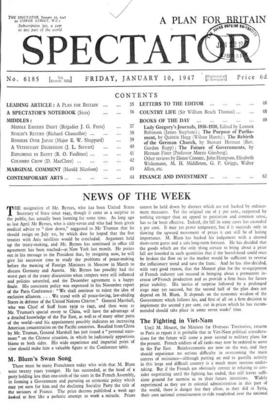NEWS OF THE WEEK
THE resignation of Mr. Byrnes, who has been United States Secretary of State since 1945, though it came as a surprise to th public, has actually been looming for some time. As long ago as last April Mr Byrnes, who is sixty-seven and who had been given medical advice to " slow down," suggested to Mr Truman that he should resign on July 1st, by which date he hoped that the five treaties with Axis satellites would be concluded. Argument held up the treaty-making, and Mr. Byrnes has continued in office till agreement has been reached—at New York last month. He points out in his message to the President that, by resigning now, he will give his successor time to study the problems of peace-making before the meeting of Foreign Ministers in Moscow in March to discuss Germany and Austria. Mr. Byrnes has possibly had the worst part of the treaty discussions when tempers were still inflamed and policies unsettled, and the December agreement is a happy finale. His consistent policy was expressed in his November report of the Paris Conference: " We shall continue to reject the idea of exclusive alliances. . . . We Stand with all peace-loving, law-abiding States in defence of the United Nations Charter." General Marshall, who was Chief of Staff from 1939 to 1945, and then went as Mr. Truman's special envoy to China, will have the advantage of a detailed knowledge of the Far East, as well as of many other parts of the world—and his appointment possibly indicates an increasing American concentration on the Pacific countries. Recalled from China by Mr. Truman, General Marshall has just issued a " personal state- ment" on the Chinese situation, in which he judiciously apportions blame to both sides. His wide experience and impartial point of view should make him a valuable figure at the Conference table.


































